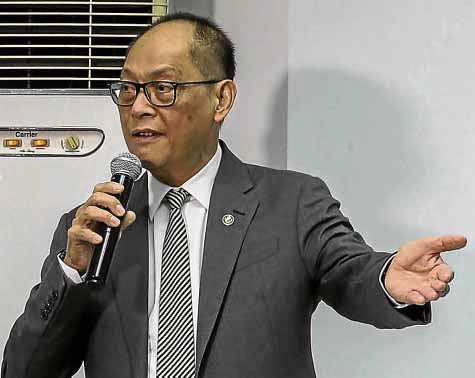Budget Secretary Benjamin Diokno caved in and agreed to let state agencies continue with “hybrid” budgeting for three years before adopting the cash-based system he had staunchly defended, according to House Majority Leader Rolando Andaya Jr.
Diokno, who previously vowed not to allow any compromise with the House, had accepted a three-year transition period for state agencies, Andaya said on Tuesday.
The budget chief did not respond to the Inquirer’s call for comment on Tuesday night.
The secretary’s turnabout came when President Duterte’s lieutenants and leaders of the House of Representatives on Tuesday finally found common ground in settling their differences over the proposed P3.757-trillion national budget for 2019.
“We have given each other the merits of our proposals and agreed on it,” Andaya said at a press briefing after attending a meeting with Palace officials led by Executive Secretary Salvador Medialdea Jr.
Hybrid budget
“We’re pushing through with what we call ‘hybrid’ budget … We will help each other in finding areas where we can source (funds to restore) the (budget) cuts,” he said.
Finance Secretary Carlos Dominguez III and Davao City Rep. Karlo Nograles, chair of the House appropriations committee, also attended the meeting in Malacañang.
Under a cash-based budget, contractual obligations and payments for goods delivered and services rendered should be made within one fiscal year, according to the Department of Budget and Management.
In an obligation-based budget, contracts awarded before the end of the fiscal year can be delivered even after the fiscal year and the government has a running balance of not-yet-due-and-demandable obligations.
Diokno said at the Meet Inquirer Multimedia forum on Aug. 14 that the cash-based appropriations system that he wanted to implement next year was “nonnegotiable.”
If the House would not stand down, “we are ready for a reenacted budget,” he said.
The Constitution states that if Congress fails to pass the budget by December, the current budget is deemed reenacted for the next fiscal year.
Like Diokno, presidential spokesperson Harry Roque had said that Malacañang would never cave into the demand of the supermajority in the House to drop the shift to cash-based budgeting in 2019.
The 292-member House had opposed Diokno’s cash-based appropriations, arguing that the policy will lead to the substantial decrease in the budgets of state agencies tasked with undertaking Mr. Duterte’s “Build, Build, Build” program.
House plenary
Andaya reiterated on Tuesday that the chamber would not agree to have a reenacted budget.
The majority leader said Malacañang and the House agreed to pass the proposed national budget on third reading in the House plenary on Oct. 12.
“For projects which have been obligated and need to be finished within the year, they will be given an extension to finish it,” the Camarines Sur lawmaker said.
“We also discussed the effects and, shall we say, the bumps along the way when we fully implement cash-based budgeting and agreed for a transition period,” he said.
Andaya said Palace officials and House leaders also agreed that the departments whose allocations for 2019 had been slashed, such as the Department of Education and the Department of Health, needed additional funds to carry out their mandate.
“We will have a unified voice on this matter. And we want a new budget. That’s clear,” he said.
To address the lack of funds, Andaya said the House could use the money from “unprogrammed” allocations or pass a supplemental budget.
“As early as now, we’re doing the numbers-crunching. We’re also looking at the revenue side to support the additional expenditure of the government,” he said.
